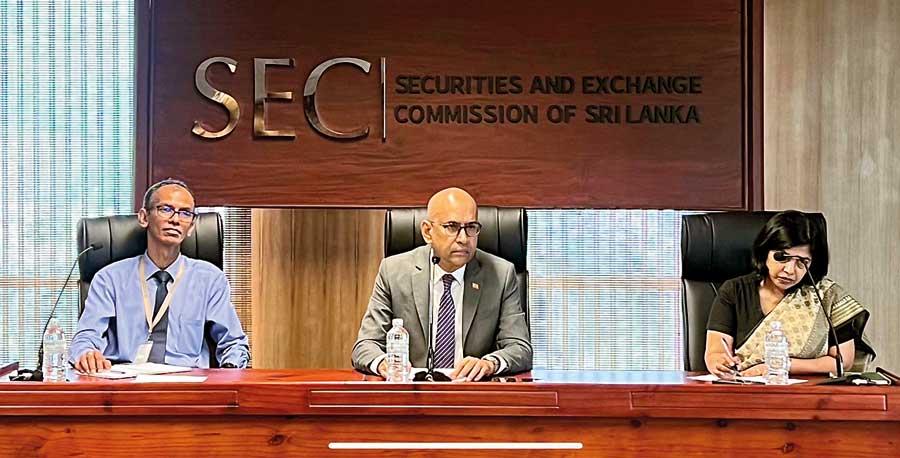11 Mar 2024 - {{hitsCtrl.values.hits}}

Officials at a recent stakeholder meeting
The Securities and Exchange Commission’s (SEC) introduction of a regulatory framework for the operation of exchange-traded funds (ETFs) and umbrella schemes, under the Collective Investments Code 2022 (CIS Code), has not yielded the required results, as no applications from managing companies have been received for the establishment of such schemes as yet.
At a recent stakeholder meeting, SEC Chairman Faizal Salieh urged the industry representatives to identify the interests of different investor categories, target segments and design new and relevant products that would enhance the overall attractiveness of the unit trust industry to the investor public.
He suggested that the unit trust industry introduces capital protected investment schemes, where the managing company would be able to provide a return to its clients whilst preserving the capital.
The meeting also discussed barriers to real estate investment trusts (REITs) and what is required to be addressed in this regard to generate value for the product. Stock borrowing and lending (SBL), which was introduced in November last year, is restricted for unit trusts, due to concerns related to risk management. The SEC officials stated that the SEC would consider permitting SBL under new schemes, with proper risk management controls in place.
In terms of investor education regarding the unit trust industry, SEC Deputy Director General Tushara Jayaratne assured that in order to support their investor awareness role, the unit trust industry would be given a specific opportunity to make presentations to the public during investor education programmes organised by the SEC as well as the CSE.
The SEC officials urged the Unit Trust Association to play an active part in promoting and developing the industry’s image, products and schemes across the industry.
Salieh stated that product innovation and creating new value propositions to the market would be considered as factors in the licensing process of the managing companies in future.
Currently, there are 17 licensed managing companies, which have established and operates 86 unit trust schemes in Sri Lanka.
Unit trust basics
What are unit trusts?
A unit trust is a pool of funds collected from a number of investors who share a common financial goal.
Funds collected from the investors are invested in various financial assets such as shares, Treasury bills, Treasury bonds, debentures and other securities. The income earned from these investments and the capital appreciation is shared by its unit holders in proportion to the number of units owned by them.
How does it work?
A unit trust is an unincorporated mutual fund structure that holds assets and provides profits to individual unit owners instead of reinvesting into the fund. A unit trust is established under a trust deed and the investor is the beneficiary.
Who can invest in unit trusts?
Individuals, resident in Sri Lanka and foreign nationals, who are above 18 years of age, can invest in unit trusts. Companies and institutions incorporated or established in Sri Lanka and outside Sri Lanka, too.
Who manages funds of a unit trust?
The funds collected from the investors will be managed by a professional fund manager employed by the fund management company. The investment decisions are usually based on rigorous research carried out by the research analysts of the fund management company. The fund manager will take the necessary investment decisions and asset allocation decisions based on the objective of the fund.
(Unit Trust Association of Sri Lanka)
29 Nov 2024 9 hours ago
29 Nov 2024 29 Nov 2024
29 Nov 2024 29 Nov 2024
29 Nov 2024 29 Nov 2024
29 Nov 2024 29 Nov 2024